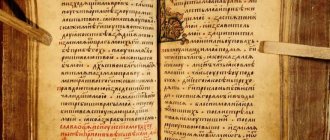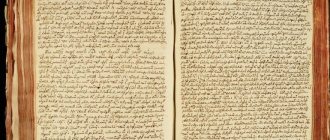Text of Psalm 37
Like other songs included in the collection “Psalter,” this one is performed in churches in Church Slavonic. This version of the text can also be used for personal prayer, although for a better understanding of its content it is recommended to read the modern Russian translation.
In Church Slavonic
In Russian
The history of writing the psalm and the mystery of authorship
Before we talk in more detail about the history of this text, it is worth mentioning why it is so famous. As mentioned above, most psalms are known to Christians for one simple reason - they are used during liturgies and church services. The same applies to this text. It is customary to read it during the Six Psalms. This psalm comes second. Therefore, those people who attend church quite often should be very familiar with the text.
Due to numerous requests from readers, we have prepared an “Orthodox Calendar” application for smartphones. Every morning you will receive information about the current day: holidays, fasts, days of remembrance, prayers, parables. Download for free: Orthodox Calendar 2022 (available on Android)
Using the words of this divine text, a person has the opportunity to turn to the Almighty and express repentance to him. Moreover, the song praises the Creator and conveys man's delight in the power of heaven.
If we talk specifically about the historical context, it is believed that the song represents the cry of the soul of King David. As you know, he was punished by God for committing a terrible sin. That is why a terrible curse fell on his family, which could easily destroy the entire royal family and deprive the ruler himself of life.
However, thanks to the mercy of the Almighty and the prudence of David himself, this was avoided. The king was pardoned and since then led an exclusively pious lifestyle, trying to attract as many people as possible to religion.
History of writing
It is difficult to connect Psalm 37 with a specific historical event, the life period of David, but experts focus on the injunction “In remembrance of the Sabbath.” This line, immediately preceding the text, has been carefully studied by historians and theologians. They managed to find out that it does not indicate a specific day of the week, it speaks of the prophet’s state of mind, the mood in which he was at the time the song was composed. He wrote it in a moment of peace that followed deep repentance, which allowed him to become closer to the Lord.
At the same time, the text of the prayer contains lines that suggest that at the same time David was on the verge of depression, in a depressed state. Also, experts tried to connect Psalm 37 with other songs of the Psalter. This allowed them to create three main versions of the history of the writing of this work:
- The prayer was composed during the period of the king’s wanderings, when he was persecuted by Saul.
- David wrote Psalm 37 after he committed the sin of adultery with Bathsheba, another man's wife.
- The Prophet confronted Absalom, his own heir, and struggled with a serious illness.
Unknown Psalms
The psalms carry an important meaning, therefore in the Orthodox religion it is not customary to consider them less effective than prayers. Moreover, they are used very often not only by Orthodox Christians, but also by clergy. Most of these texts were included in the service. This means that such texts can be heard quite often in church services. Especially if a person visits the temple not only on holidays, but also on weekdays.
Find out what awaits you today - Horoscope for today for all zodiac signs
Some psalms are well known to Christians, but some they may not even know about until a certain point. In this case, everything completely depends on how much people are interested in religion and develop spiritually. Since not all psalms are used in worship. Consequently, among them there are also texts that the believer learns about at the moment when he begins to engage in his own enlightenment.
According to church ministers, this aspect is very important. After all, it is impossible to convey absolutely all the information to a Christian. He must also make some effort to become closer to the Lord. And in this case, we are talking not only about godly deeds.
It is very important that a person tries to study religion and everything connected with it as best as possible. Of course, it is recommended to pay special attention to the study of the psalms. One of the most famous in Orthodoxy is Psalm 37.
Meaning
The text of Psalm 37 describes the author’s different emotions, but the emphasis is on mental anguish and repentance. The Prophet emphasizes that sin and apostasy hit not only the soul, but also the body, which is why various ailments follow.
The first half of the work is devoted to a description of the sins that David regrets committing. Here he connects his mistakes with the torments of the present. He repents of the follies of the past, his distance from the Lord, loved ones, and like-minded people. Facing loneliness, he also faced many attacks from the king's enemies, which he, helpless and vulnerable, found difficult to cope with.
At the end of the song, the prophet turns to the Almighty, asking him for protection and mercy. In the One Creator he recognizes his only salvation.
Detailed interpretation of the psalm
The main idea of Psalm 37 is repentance. The prophet asks the Almighty to have mercy on him and forgive all his sins. And only then does he beg for protection. Each verse of the psalm, of which there are 23 in the work, consists of deep experiences, mental anguish and heartfelt complaints of the author. Far from his homeland, the psalmist suffers from physical and spiritual weakness.
Thus, verse 4 deals with the relationship between sinfulness and human suffering. The line “from Your wrath... from my sins” emphasizes the author’s thoughts that every sin will be punished. The psalmist considers his illnesses and mental anguish to be the result of sinful acts committed during his life.
Verse 12 deals with thoughts of loneliness and forced wandering. The next line talks about the betrayal of loved ones and the militia of enemies. The result of such thoughts was the complete helplessness of the author, which is mentioned in verse 14.
The final lines of the work - from 16 to 23 - reflect the humility and repentance of the psalmist. In his speeches, David turns to the Lord God with requests for repentance, mercy and protection.
How to read Psalm 37
Psalm 37 is found in the following versions: in Russian, Synodal and Church Slavonic. The latter option is used in services in churches; many also prefer to use it for private prayer, however, this is not necessary. Reading the translation of the song is not a sin, and besides, this text is easier for an unprepared righteous person to understand.
Like other prayers, Psalm 37 is said with sincere faith in the heart, with maximum concentration. Communication with the Almighty is a sacrament for which you need to sit in front of a holy image, a lit church candle, and completely isolate yourself.
When should you read and listen to Psalm 37?
no comments
From the interpretation of Psalm 37, it follows that this song was written by David during one of the most difficult periods of his life - the persecution of Saul, the rebellion of Absalom, or after the atrocity associated with the death of Bathsheba’s husband, whom the prophet David sent to death in order to take possession of his wife. This is evidenced by the general mood of the psalm - from the first lines it becomes clear that it was written by a person in deep sorrow, on the verge of despair.
The text of the Christian Psalm 37 from the first to the last line is a continuous cry to the Lord with a request to have mercy on the author and moderate his grave troubles, since the writer’s strength is already at its limit. As an argument, the psalmist brings to God his sincere repentance and full awareness of the gravity of the sins he has committed. “I acknowledge my iniquity, I lament my sin” (Ps. 37:19) - David cries out to the Lord, asking for mercy.
But it should be noted that Orthodox Psalm 37, like all the writings of King David, is distinguished by hope and faith in the mercy of God, which shines through crying and will not send His servant more trials than he can withstand. People suffering from depression and mental anguish should listen and read Psalm 37 online.
Listen to the video of the Orthodox prayer Psalm 37 in Russian
Read the text of the prayer Psalm 37 in Russian
Memories of Saturday
God! Do not rebuke me in Your wrath, and do not punish me in Your anger, for Your arrows have pierced me, and Your hand is heavy on me. There is not a whole place in my flesh from Your wrath; there is no peace in my bones from my sins, for my iniquities have gone beyond my head, like a heavy burden they have weighed me down, my wounds stink and fester from my madness. I am bent and completely drooping, I walk around complaining all day, for my loins are full of inflammation, and there is no whole place in my flesh. I am faint and broken beyond measure; I scream from the torment of my heart. God! All my desires are before You, and my sighing is not hidden from You. My heart trembles; My strength has forsaken me, and the light of my eyes, and even that I have no more. My friends and sincere ones have retreated from my plague, and my neighbors stand afar off. Those who seek my soul lay snares, and those who wish me harm speak of my destruction and plot intrigues every day; but I am like a deaf man who does not hear, and like a dumb man who does not open his mouth; and I became like a man who does not hear and has no answer in his mouth, for in You, O Lord, do I trust; You will hear, Lord my God. And I said: Let not my enemies triumph over me; when my foot falters, they magnify themselves over me. I am close to falling, and my sorrow is always before me. I recognize my iniquity, I lament my sin. But my enemies live and are strengthened, and those who hate me without guilt multiply; and those who repay me evil for good are hostile against me because I follow good. Do not leave me, Lord, my God! Don't move away from me; hasten to help me, O Lord, my Savior!
Orthodox Psalter, text of Psalm 37 in Church Slavonic language
Lord, do not reprove me with your wrath; do not punish me with your anger; for your arrows struck me, and you strengthened your hand on me. There is no healing in my flesh from the face of your wrath, there is no peace in my bones from the face of my sin. For my iniquities have exceeded my head, for a heavy burden has weighed down upon me. My wounds have grown stale and rotten in the face of my madness. I suffered and sloshed to the end, walking around complaining all day; for my body is filled with reproach, and there is no healing in my flesh. I would become embittered and humbled to death, roaring from the sighing of my heart. Lord, all my desire is before you, and my sighing cannot be hidden from you. My heart is confused, my strength has left me, and the light of my eyes has left me, and that one is not with me. My friends and my sincere ones are approaching me directly and stasha. And my neighbors are far away from me, and I am in need of those who seek my soul; and those who seek evil speak vain words to me, and I will learn from the flatterers all day long. But I am deaf and do not hear, and I am dumb and do not open my mouth; and as a man he would not hear, nor would he have reproof in his mouth. For in you, O Lord, have I trusted, you will hear, O Lord my God. Yako reh; Yes, not when my enemies will rejoice; and my feet can never move, you speak to me. As if I am ready for wounds, and I will bear my illness before me. For I will proclaim my iniquity and take care of my sin. My enemies live and have become stronger than me, and have multiplied in those who hate me without truth; repaying evil with good things to those who slandered me, driving away goodness. Do not forsake me, O Lord my God, do not depart from me; Come to my help, O Lord of my salvation.
Rules for reading the psalm
Reading this or that prayer, a person involuntarily begins to think about how to do it correctly. After all, there are certain rules that are outlined by the church for absolutely all worshipers. The same goes for the psalms.
There are certain requirements for the process of reading psalms that must be obeyed:
- It is better to read the text in Old Church Slavonic, since this will help to better understand its meaning. But even in this case, exceptions are possible. If a person has a hard time with this language, he can read the text in Russian;
- during prayer, you can light a candle to tune in to a certain mood and offer your prayer in accordance with all the canons;
- Since the psalm is a song, its text must be chanted. You can learn this by visiting church and listening to the choir;
- while reading a psalm, a person should not have any anger or irritation in his heart;
- When talking with the Almighty through a psalm, one should remember that He sees the soul of a person. And therefore, you cannot deliberately try to hide something from the Lord and hope that it will go unnoticed.
These rules are very easy to follow because they are not complicated. It is for this reason that the Church insists that they not be violated. Moreover, this will help a person to get even closer to the Lord and demonstrate his zeal and desire to know religion.






